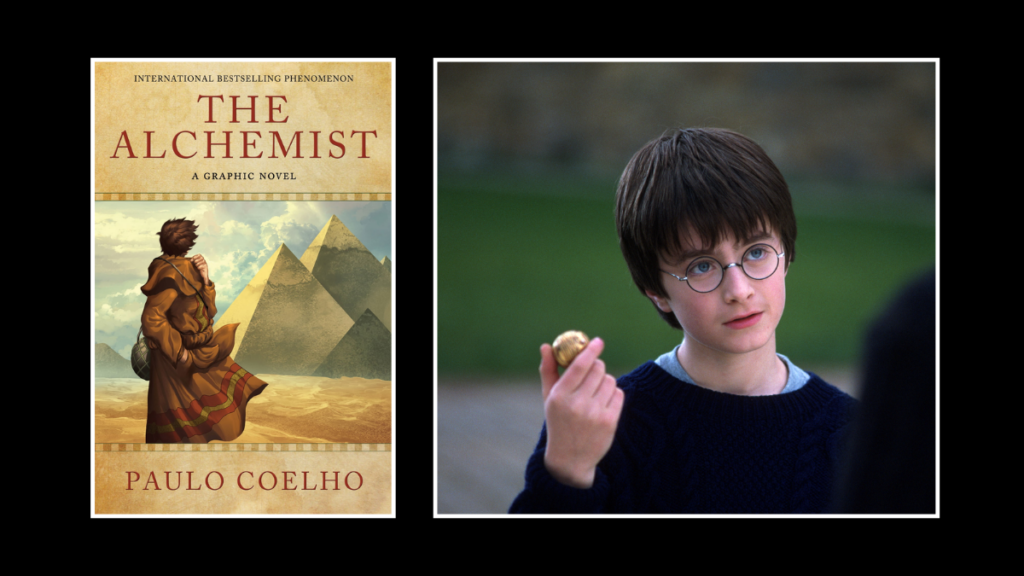Alchemy, an ancient practice often associated with the transmutation of base metals into gold, is much more than a historical precursor to modern chemistry. At its core, alchemy is a rich metaphor for the process of spiritual and psychological transformation. The alchemical journey—symbolized by stages like purification, dissolution, and rebirth—parallels the transpersonal process of moving beyond the ego to achieve higher states of consciousness and self-realization. In pop culture, these alchemical symbols and themes are frequently woven into the fabric of literature, film, and music, offering audiences a mirror to their own journeys of personal transformation, enlightenment, and spiritual rebirth.
Alchemy in Literature: The Hero’s Transformative Journey
Literature has long been a fertile ground for the exploration of alchemical themes, where characters often undergo profound personal transformations that echo the alchemical process. One of the most famous examples is ‘The Alchemist’ by Paulo Coelho. This novel, a modern-day parable, follows the journey of Santiago, a shepherd boy who embarks on a quest to find a hidden treasure. Along the way, Santiago encounters various symbolic figures and experiences that lead him through the stages of alchemical transformation: from purification (the decision to pursue his Personal Legend) to conjunction (his union with the soul of the world), and finally to the realization that the treasure lies within.
Coelho’s novel illustrates the transpersonal journey, where the search for material wealth (the gold of alchemy) transforms into the discovery of spiritual truth and self-knowledge. The alchemical process here is not just about the literal transformation of metal, but about the transmutation of the self from a state of ignorance to one of enlightenment.
Similarly, J.K. Rowling’s ‘Harry Potter’ series is steeped in alchemical symbolism. The Philosopher’s Stone, central to the first book, is a direct reference to alchemy’s ultimate goal. Throughout the series, Harry’s journey reflects the alchemical process, from the ‘Nigredo’ or blackening (the dark night of the soul Harry experiences) to the ‘Rubedo’ or reddening (his final transformation and acceptance of his role). The stages of Harry’s journey mirror the alchemical stages of dissolution and coagulation, representing his growth from a boy into a self-aware, enlightened individual.
Alchemy in Film: Visual Metaphors of Transformation
Film, with its ability to blend visual storytelling with symbolic imagery, often uses alchemical themes to represent the transpersonal process. One of the most iconic examples is ‘The Matrix’ (1999), where the protagonist Neo undergoes a journey that is deeply alchemical in nature. Neo’s awakening from the illusory world of the Matrix into the harsh reality parallels the alchemical process of nigredo, where the old self must die to make way for the new. His eventual mastery over the Matrix and realization of his true nature symbolize the completion of the alchemical process, leading to enlightenment and the “philosopher’s stone” within.
Another film rich with alchemical symbolism is Darren Aronofsky’s ‘The Fountain’ (2006). This film weaves together three parallel narratives, each exploring themes of death, rebirth, and the search for immortality—central themes in alchemy. The imagery of the Tree of Life, the merging of characters with cosmic consciousness, and the cyclical nature of life and death all serve as visual metaphors for the alchemical process of spiritual transformation. The film’s exploration of eternal life and the pursuit of enlightenment is a cinematic reflection of the alchemical goal of transcending the material world to achieve spiritual purity.
Alchemy in Music: Soundscapes of Transformation
Music, too, is a powerful medium for expressing alchemical and transpersonal themes. The album ‘Lateralus’ by the band Tool is a prime example, with its complex rhythms, lyrics, and musical structure reflecting the process of spiritual transformation. The title track, ‘Lateralus,’ explores the concept of spirals—a symbol often associated with the cyclical nature of alchemical transformation and spiritual growth. The lyrics encourage listeners to “spiral out” and embrace the unknown, reflecting the alchemical idea of pushing beyond the boundaries of ordinary consciousness to achieve a higher state of awareness.
Another significant example is David Bowie’s album ‘Blackstar’ (2016), which was released just days before his death. The album, with its themes of mortality, rebirth, and transformation, serves as a final act of alchemical self-expression. Bowie’s exploration of death and the afterlife in songs like ‘Lazarus’ is deeply symbolic of the alchemical process of death and rebirth, where the physical death becomes a metaphor for the transmutation of the soul.
The use of alchemical themes in music, particularly in genres like progressive rock and experimental music, often mirrors the listener’s own journey through life’s challenges and transformations. These soundscapes create a shared experience of moving through darkness into light, resonating with the alchemical pursuit of spiritual enlightenment.
The Alchemical Process as a Metaphor for Transpersonal Transformation
At its essence, alchemy is a metaphor for the human journey of self-discovery and spiritual growth. The stages of alchemical transformation—nigredo (blackening), albedo (whitening), citrinitas (yellowing), and rubedo (reddening)—represent the psychological and spiritual processes of breaking down the ego, purifying the soul, and achieving a higher state of consciousness.
In pop culture, these themes are expressed through characters who undergo profound transformations, narratives that explore the nature of reality and consciousness, and music that evokes the emotional depths of the alchemical process. The presence of alchemical symbols and themes in literature, film, and music offers audiences not just entertainment, but also a mirror to their own journeys of personal transformation. These stories and images resonate with us because they reflect the universal experience of moving through the darkness of uncertainty and fear into the light of understanding and self-realization.
Also Read: Anime and the Archetypal Journey: Transpersonal Themes
As we continue to engage with pop culture, the enduring appeal of alchemical themes reminds us of the timeless human quest for meaning, enlightenment, and the transmutation of the ordinary into the extraordinary. The alchemy of pop culture, much like the ancient practice itself, is ultimately about the transformation of the self—turning the lead of our everyday experiences into the gold of spiritual insight and personal growth.
–Silviya.Y
